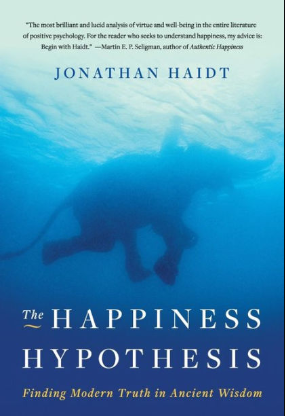Posted: April 29, 2023
The Happiness Hypothesis

This book is a teacher looking for a student. Not just any student, it is looking for the student who is asking: Why am I not happy?
How did I ever get to know about this book? YouTuber. Don't remember who he is. Don't remember his channel. Whoever you are sir I'm very grateful. Anyway, he gave a summary of this book and when I heard it, I just had to get me a copy of "The Happiness Hypothesis". And I did. And I'm glad I did.
See that cover? It's an elephant with a rider on top. It's not just a nice cover. Jonathan Haidt uses the metaphor of the rider and the elephant as a helpful way of thinking about the human mind. The rider is our conscious self; the elephant is that part of us that does what it wants, even if our conscious mind disagrees. This is a pretty clumsy explanation; Jonathan explains it perfectly in the book.
Well I might as well throw in a metaphor of my own: A mountain full of precious gems and metals. That's my metaphor for this book. It's loaded with wonderful learnings. One reading really isn't enough, I'm sure I missed a lot. But I still got a lot of good stuff. I might as well list them down so I don't forget.
Conscious vs. Automatic Actions
There are times during workday mornings when I would wake up with a bad feeling, a sort of pressure in my chest. This is not physical but psychological. During such times I would usually meditate to ease or even erase this figurative cloud over my head. I've always wondered what it was and I would sometimes wish that I'd find a book to explain it. But that would be too lucky, I would think - to find a book that would explain it. Well "The Happiness Hypothesis" explains it.
According to "The Happiness Hypothesis" there are certain actions in our minds that are automatic. These automatic actions stem from our evolutionary past. That is why we do things and feel things that we don't consciously summon - like the bad feeling I have in the mornings. This is the elephant in our head, moving based on its own volition - acting automatically.
What a comfort it is to finally learn this and to be aware of the elephant. One other thing that I am aware of is my tendency to overeat or to snack, that, too, is the elephant. So now when I feel these urges and I know it's the elephant. I look at it, I look at the elephant. And that helps; simply looking at it helps.
Meditation
I have been practicing meditation for a number of years now. I started doing it as a reaction to stress. I dont' know what I would do without it. This book affirms the power and benefit of meditation and points to it as one way we can "tame the elephant", and, in so doing, become happier.
Prozac
My personal reaction to pill-popping as a response to depression is decidedly a negative one. So this books affirmation of Prozac as a valid route to take to improve one's outlook has me raising my eyebrows. It also compels me to rethink my stance. What got me was Haidt's reference to Prozac as akin to using glasses. I don't have a problem about using corrective lenses for my eyesight; Prozac does the same thing for the mind. Now I am more open to Prozac and other anti-depressants.
Level of Happiness
I have always believed that more money equals more happiness. The wealthy are happy; the poor are not.
That said, I know at some level of consciousness that I'm wrong. There are rich people who are clearly unhappy and there are poor people who are clearly happy.
This book really forces me to reassess this opinion; and the arguments are convincing. First of all, according to "The Happiness Hypothesis" we all have a happiness baseline. There are those people who are naturally happy and those who are naturally gloomy (canditates for meditation, Prozac, or psychological help); the degree of happiness and gloominess varies per person. Here's the eye opener: We naturally gravitate to this baseline no matter our material circumstances. This is big. This means that wealthy people do not have a monopoly on happiness and that poor people are not doomed to despair.
Moreover, what this means, is that no matter our life situation, we will always adjust back to our baseline level of happiness. The key is to move this baseline.
Religion
I have lost my religion and I am negative about the concept of religion. But then, once again, this book forces me to rethink my opinion.
Being part of a group, and subscribing to the belief systems of a group, is one of the keys to being happy. Religions are such groups.
Work
One way to increase happiness is "being in the zone". This can happen at work provided that (1) we are using our strengths at work and (2) we see value in the work we do. "Being in the zone" means expressing love and joy through our work.
In Conclusion
This book has answered a lot of important questions for me and I'm very thankful to have read it. Jonathan Haidt not only references psychology but also philosophy, religion, and medical science. This is a great example of a book that synthesizes, questions, challenges and builds upon the books and knowledge of the past. Thank you for this Jonathan Haidt. My life is a better because you wrote this book.